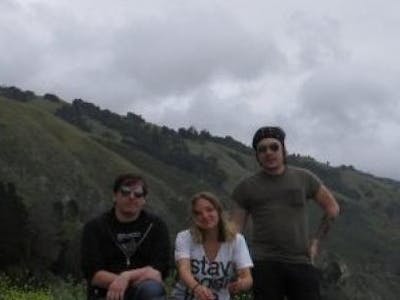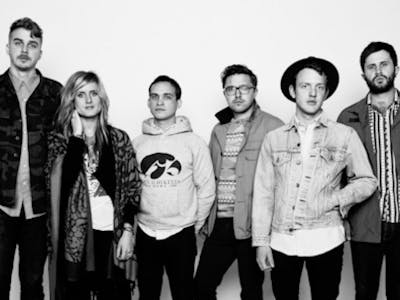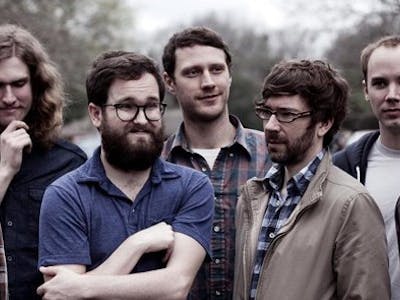It's 11 am on a Sunday, Eastern Time, and I am calling the Eastern Sea's Matt Hines for a pre-arranged interview. The trouble is, he's not answering.
Hi, thanks for calling Matt Hines' cell phone. Sorry I missed your call, but my phone's either on silent, or I've tragically died and somebody forgot to turn off my account. But don't weep for me yet: there's always the off chance I could rise from the grave, see that I missed your call, call you back and share with you the good news that I have risen.
BEEP.
"Matt, this is Jonathan Goolsby, from CincyMusic. I just realized your tour route probably has you in a place where you're on Central Time. I'll try you back in an hour. I hope you haven't died."
And before I can get up and go to the kitchen for a joe refill: ring. RING.
It's Hines. The Eastern Sea played the night before to a reportedly capacity crowd in Chicago. He's calling from a basement.
"No, no, it's cool," he apologizes. "That was a classic Central Timer."
And it has been an interesting outing so far. Already, The Eastern Sea have had to meet up with their tour mates, Kopecky Family Band, and give them a tow.
"They've been getting used to driving a diesel in, like, negative-degree weather, which is interesting," Hines chuckles. "The fuel just gels up like nothing."
This trip, The Eastern Sea is out as a five-piece.
"Different tours call for different lineups," Hines says. Right now, they are guitar, bass, drums, keys and trumpet.
"We just played Madison — I really liked Madison. We like Annapolis, Maryland. There's a place called the Metropolitan there that's really cool. We like the people there — we've been treated so nice. We met Jimi Haha, from ['90s post-grunge outfit] Jimmie's Chicken Shack. He's a visual artist now; he basically lives at this place. He's become one of our bigger fans. It's funny."
The Eastern Sea is on their way to Newport's Southgate House Revival, where they will open for Kopecky. On different nights, the bands trade off the headliner and opener roles. I want to know how being in opener position affects performance.
"It's a freeing experience," Hines offers. "We feel a little bit less pressure. We have a clearer idea of what people want. If you're the opening band in a room of people who expect you to be the opening band, I think you're at a good position and you can really cash in on your work."
Elaborate.
"I look at the role of being a traveling musician as something that's really fluid," Hines says. "I feel like every time we step into a room, people are expecting us to do something different, whether we're in Omaha and people expect us to make them dance, or we're in Fort Worth and everyone's sitting there just waiting to be quiet and think, or we could be in New Orleans and people are just waiting for the other band to play — I think that's where the true art comes in, because then I say, 'OK, I've got to give these people something of what they want.' At the same time, changing their expectation of what they came here tonight for is, I think, a more transformative experience."
"I don't want to manipulate people," he continues. "I'm not in the business of making people do whatever I want, but it is nice if somebody comes and is like, 'OK, opener band. I'm ready to ignore this band,' and [then we] play some really dynamic music and wrench your attention away from your beer or your conversation about how shitty your boss is, that's I think the most fun for me.
Still, it must be difficult having to consider another band will be playing behind you, and audiences can so easily suffer performance fatigue.
"Sometimes you only get a moment at a time, so you have to build your set so that it's: Moment. Lull. Moment. Lull. And then you ride it like a roller coaster. If you just come out energy, energy, energy, people are gonna get blown away. You've blown their energy before anything happens."
Two albums in, The Eastern Sea has become a recognized name outside their native Austin. They are no longer Hines' Austin bedroom recording project. I ask him what he looks for when booking — I want to know, why somewhere new-ish, like the Southgate House Revival?
"We're looking for someplace where people are going be open to meeting new people. We're not Grizzly Bear — we're not coming in like, 'Oh, you've heard of us, we're gonna sell out the show.' We're new people, and there's a different kind of audience," he explains.
"They have to be open. They have to be ready to take a risk. If there are people with open ears, that's the best place to go. You never know. Sometimes you think, oh, college towns would be really good for that, but that's often proven not to be the case. We've been having a harder time in college towns. There's more of a follow-the-leader mentality [in college towns], which isn't good for us. We're a comparatively unknown band, so our power as a band doesn't come from, 'Everyone's doing this, so why don't we do it together,' it's more like, 'Hey, I heard this band. I know you've never heard them before, so why don't you go spend an hour listening to something you've never heard. I think you're gonna enjoy it.' The places where people are willing to do that, which in my opinion is a risk — you know, spend your night listening to a band you've never heard of, at the risk they might suck — I think people who are willing to take a chance on us, we like to give back."
Cincinnati, I think, has the talent base to go tow-to-toe with the conventional music hotspots. I ask Hines about the State of the Union in Austin. He grew up there. He lives and plays there now. I want a full report.
"Usually I judge scenes by the strength of the fuel and the health of the fire. The fuel right now is really strong. Austin is a place where young people go. It's college town, so it usually has a ton of new fuel — people with good ideas. Usually, you can judge the fire based on the amount of oxygen in the environment — how much things are helped by clubs and promotion companies."
He pauses.
"Austin right now is in kind of a rut, I'd say, because there's so many new people, but there's not a lot of access to healthy venues. I would say we're on the way up from a bottom. The last couple years have been kind of tough because the places people come to see live music change at the blink of an eye."
I note that this has been a problem in Cincinnati, too.
"The scene in Austin right now has a lot of potential, but it's been slowed down by lack of professionalism, lack of pay, and reliability. You can't rely on a venue to be there and to consistently book good shows. And, I think the biggest problem is you have rooms that are too big and then you have rooms that are too small. I'd say a medium venue has a decent capacity, somewhere between 300-500 people, but at the same time, it needs to be able to be scaled back, so that if you don't have 300-500 people there, it's still enjoyable."
What, in his opinion, is the stumbling block?
"A big part of that is the production cost," Hines asserted. "Most of the enjoyable venues cost too much money for a local band to produce a show there. They have big lights, big sound, a million employees, and that isn't good for the local scene, because local bands need to make money too. A lot of times you never make any money and end up hurting yourself, because you're playing in venues that are too big or too small for you. You see a lot of bands playing in venues that don't make sense."
There's a lesson for any midsize scene, methinks. Note: the talent drives the audience, and the venue drives the talent. The problem is that often the venue forgets the audience. It's not always about the sound or the booze selection — it's about how comfortable the band and the patrons are being within the walls. The Germans have a word for it: gemütlichkeit. Loosely, it's a concept of coziness, of a feeling of acceptance. Warmth.
Meh, I wax didactic. But Hines has my wheels turning.
In the meantime, the tribulation The Eastern Sea endured while putting together their last release, aptly-named Plague, are well-documented. Let's hear about the new album.
"The next one is called The Witness," Hines says. Even over a phone line, one picks up on his enthusiasm for it.
"Plague was a purely autobiographical record; it was very much about my life after I graduated college and my life over the last five or ten years. But this record is more metaphorical. It delves into almost-fiction. Lots of high imagery."
Define high imagery.
"'The Witness' is this idea of like a muse — somebody that can hear you when you're talking to them, but you don't know they're there. I guess the main idea is the hope that there's somebody who's listening when you're speaking to the cosmos, and for good or for bad, somebody that hears everything you do."
So . . . is it a record to God?
"No. I'm not specifically coming out and talking of it that way," Hines cautions. "It's kind of threefold. 'The Witness' is a relationship between yourself and yourself, yourself and other people, and yourself and the unknown, or the transcendent. So in a way, yeah, you could say God is part of it, because it's that third element of the relationship between you and the transcendent, or the divine. But I think that there's a separate two-thirds that exist between the social relationships you have with the people you love, and the relationships that come out of your dedication to your own good and your own way of life. It's a lot of inner examination."
"I think it's a little stale to recreate, faithfully, moments of my life in the way I was trying to do with Plague. Right now, this is just naturally what I'm interested in — I guess it's just putting a bigger cloth over the lens. I want to take some risks. Now I want to do something more fiction-based. One day, I want to be able to mesh the two together. That would be my perfect style goal, but I think that's going to be a couple records from now."
Who: Kopecky Family Band, The Eastern Sea
Where: The Southgate House Revival
When: January 28, 2013; 9:00 P.M.





